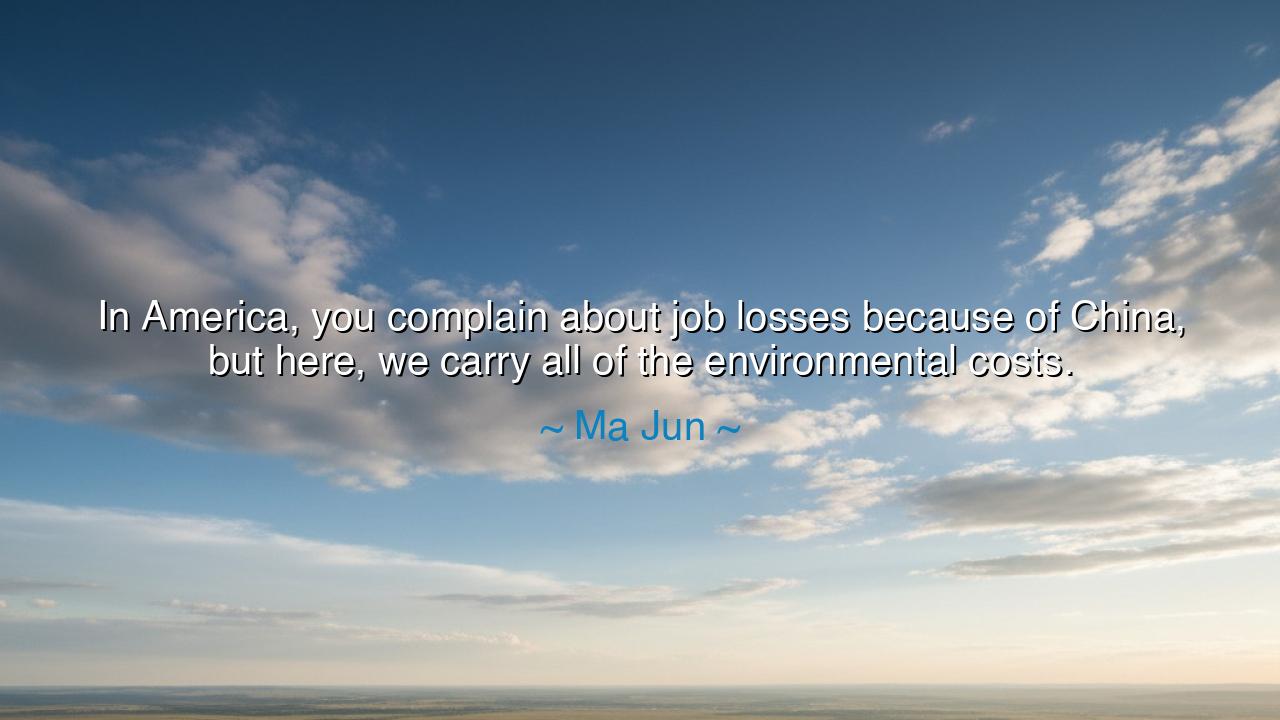
In America, you complain about job losses because of China, but
In America, you complain about job losses because of China, but here, we carry all of the environmental costs.






Hear the piercing words of Ma Jun, spoken with the sorrow of one who has watched the rivers darken and the skies grow heavy with ash: “In America, you complain about job losses because of China, but here, we carry all of the environmental costs.” This is not the cry of accusation alone, but of truth unveiled. He reminds us that in a world bound by trade and consumption, the burdens of prosperity are not equally borne. While some nations mourn the loss of factories and jobs, others are left to endure poisoned air, foul waters, and landscapes scarred by the weight of industry.
At the heart of his words lies the great paradox of globalization. The world consumes as one body, yet suffers as divided parts. Goods flow from East to West, bringing comfort and abundance to some, while leaving behind wastelands of pollution for others. Thus, the grievances of the West—of lost manufacturing, of diminished wages—are answered by the East with grievances of their own: of cancer villages, of rivers turned black, of children born under skies without stars. Ma Jun’s cry is a reminder that the world’s economy is a chain, and every link bears its weight differently.
History reveals this imbalance with sharp clarity. In the early 2000s, as China became the workshop of the world, cities like Beijing and Guangzhou saw their air grow thick with smog, while rivers such as the Huai and the Yangtze grew polluted beyond recognition. These environmental costs were the hidden price of cheap goods shipped abroad. In America and Europe, consumers rejoiced in low prices, while in China, villages paid with their health. It was a trade not of money alone, but of well-being, a silent bargain struck without consent.
Yet this is no new story. In the days of the Industrial Revolution, England grew rich upon coal and steel, while its working class coughed their lives away in soot-filled cities, and its colonies were plundered for resources. Later, as environmental protections arose in wealthier nations, much of the dirtiest industry migrated abroad, to lands where regulation was weaker and voices of protest less protected. Thus, the pattern endured: prosperity in one place, destruction in another. Ma Jun’s words are but the modern echo of this ancient imbalance.
The wisdom of his saying is not merely to accuse, but to awaken us to shared responsibility. For if the goods of industry cross oceans, so too must accountability. It is unjust to speak only of jobs lost while ignoring the forests leveled and rivers destroyed to provide those very goods. Justice demands that we see the full picture: that consumption and destruction are two sides of the same coin, and that both producer and consumer must answer for the world they shape together.
The lesson for us is stern yet full of hope: we are bound together, East and West, North and South. No nation can wash its hands of blame, for the pollution of one land becomes the climate crisis of all. The smoke that rises in China does not stop at its borders; it joins the winds that sweep the globe. The choices made in one marketplace echo in the lives of distant strangers. Thus, justice and survival alike demand that we move beyond blame, and instead forge paths of cooperation—cleaner production, fairer trade, and shared stewardship of the earth.
Therefore, children of tomorrow, take Ma Jun’s words as a call to conscience. When you buy, ask who pays the hidden price. When you prosper, ask who suffers in silence. Let your choices honor not only your own need, but the dignity of those who bear unseen burdens. And let nations, too, remember that the true wealth of the world is not in factories or markets, but in clean rivers, clear skies, and the health of its people. Only when all share in both prosperity and protection shall we call our civilization just.






AAdministratorAdministrator
Welcome, honored guests. Please leave a comment, we will respond soon